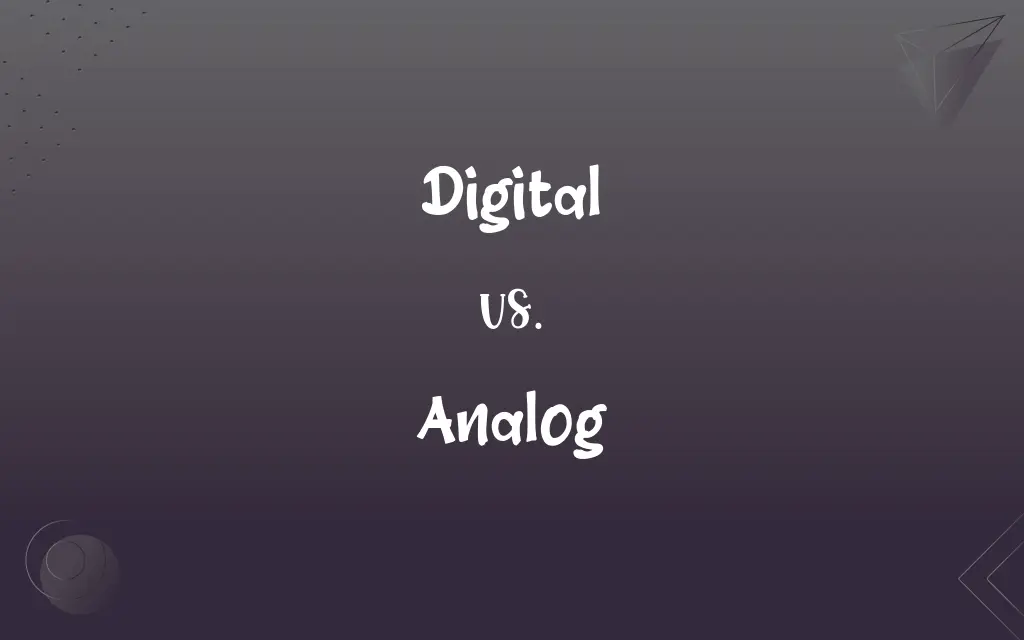Digital vs. Analog: What's the Difference?
Edited by Janet White || By Harlon Moss || Updated on October 23, 2023
Digital represents data using discrete values, often 0s and 1s, while analog uses continuous signals or physical quantities.

Key Differences
Digital and analog are terms frequently used to describe how information is represented. Digital methods encode information using a series of discrete values, commonly binary code consisting of 0s and 1s. In contrast, analog represents information through continuous signals or varying physical quantities.
Digital technologies, such as computers and smartphones, rely on binary systems to process and store data. This binary system ensures precision, repeatability, and resistance to noise in data transmission. Analog, however, often manifests in waveforms like those in traditional radio or vinyl records, where data is conveyed in continuous, variable forms.
While digital systems have become dominant in modern technology due to their accuracy and ease of replication, analog systems are prized for their ability to capture the infinite variability of the real world. An analog watch, for instance, displays time with rotating hands, while a digital watch displays time using numerals.
Both digital and analog have their strengths and applications. Digital excels in data storage, computation, and communication, making it integral in today's interconnected world. On the other hand, analog remains invaluable in contexts like music production, where the continuous nature of analog recordings can capture nuances digital might miss.
It's worth noting that the distinction between digital and analog is not always clear-cut. In many situations, analog signals are converted into digital for processing and then back into analog for human consumption, such as in digital music playback systems.
ADVERTISEMENT
Comparison Chart
Representation
Discrete values (often 0s and 1s)
Continuous signals
Susceptibility to Noise
Less susceptible
More susceptible
Examples
Computers, digital clocks
Vinyl records, analog clocks
Nature
Precise, repeatable
Continuous, variable
Use in Modern Technology
Data storage, computation, communication
Music production, traditional broadcasting
ADVERTISEMENT
Digital and Analog Definitions
Digital
It involves systems or devices relying on digital techniques.
The rise of digital media has changed how we consume entertainment.
Analog
Analog involves data in a form that's continuous in nature.
Vinyl records have analog grooves that reproduce sound.
Digital
It refers to technology using digits, especially binary digits.
Digital cameras convert images into a series of 0s and 1s.
Analog
It's a system susceptible to disruptions from noise or interference.
Analog TV broadcasts can show snow due to weak signals.
Digital
Digital often describes systems unaffected by analog noise.
Digital recordings maintain clarity even after multiple copies.
Analog
It describes a mechanism that mirrors or simulates something.
An analog watch's moving hands simulate the passage of time.
Digital
Digital pertains to data represented using discrete values.
Digital devices like smartphones use binary code for operations.
Analog
Analog refers to a system where data is represented by continuously variable quantities.
Analog radios capture signals using continuous waveforms.
Digital
Digital emphasizes precision and repeatability in representation.
Digital watches display precise time with numerical digits.
Analog
Analog often contrasts with digital in the realm of technology.
Analog phones are becoming rare with the prevalence of digital cell phones.
Digital
Relating to or resembling a digit, especially a finger.
Analog
Something that bears an analogy to something else; something that is comparable
“Titan, Saturn's giant moon … seems like an analog of the environment of Earth on the eve of life” (David Grindspoon).
FAQs
Is the sound quality better in analog or digital music?
This is subjective; some prefer analog's warmth, while others value digital's clarity.
Are digital systems immune to interference?
They're less susceptible, but not immune to interference.
Are all modern devices digital?
No, while many are digital, some devices still use analog methods.
Are vinyl records analog or digital?
Vinyl records are analog.
Do analog systems always represent the real world more accurately?
Not always; analog can capture continuous variability, but digital can offer precision.
What is an example of analog data in nature?
The varying brightness of a sunset is analog.
Why might some artists choose analog equipment in a digital age?
For the distinct characteristics or aesthetics analog equipment can offer.
Can analog signals be converted to digital?
Yes, analog-to-digital converters are used for this purpose.
Can digital systems mimic the look or sound of analog?
Yes, through techniques like digital filters or emulation.
Why has digital technology become so prevalent?
Digital tech offers precision, ease of replication, and efficient storage.
Are digital recordings always of higher quality than analog?
Not necessarily; quality depends on factors like bit rate for digital and the recording medium for analog.
How do digital clocks differ from analog ones?
Digital clocks display time numerically, while analog ones use moving hands.
Is the transition from analog to digital always an upgrade?
Not always; it depends on the application and desired outcomes.
Can digital systems simulate analog processes?
Yes, through various techniques like sampling and modulation.
Can a system be both digital and analog?
Many systems convert analog inputs to digital for processing and vice versa for output.
Do digital devices always need electricity?
Most do, but some can operate with other energy sources like solar.
Is film photography analog or digital?
Traditional film photography is analog.
What's an advantage of digital communication?
Digital communication can be encrypted for security.
Is analog technology becoming obsolete?
While less dominant, analog still has niche uses and value in various fields.
Why might someone choose analog over digital in music recording?
Analog can capture certain nuances and warmth some artists prefer.
About Author
Written by
Harlon MossHarlon is a seasoned quality moderator and accomplished content writer for Difference Wiki. An alumnus of the prestigious University of California, he earned his degree in Computer Science. Leveraging his academic background, Harlon brings a meticulous and informed perspective to his work, ensuring content accuracy and excellence.
Edited by
Janet WhiteJanet White has been an esteemed writer and blogger for Difference Wiki. Holding a Master's degree in Science and Medical Journalism from the prestigious Boston University, she has consistently demonstrated her expertise and passion for her field. When she's not immersed in her work, Janet relishes her time exercising, delving into a good book, and cherishing moments with friends and family.






























































